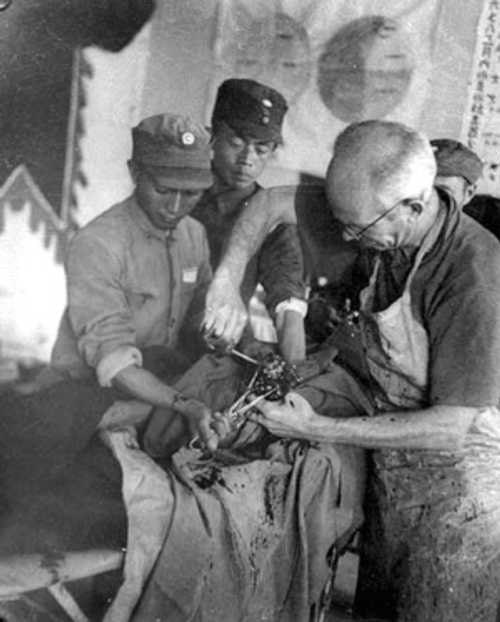
Chinese Forces
Dr. Bethune is operating on a wounded soldier
Henry Norman Bethune (March 3, 1890 – November 12, 1939) was a Canadian physician and medical innovator. After developed the first mobile blood-transfusion service in Spain in 1936 of the civil war, he became a volunteer again in 1938 to help Chinese people fight the Japanese. Dr. Bethune is a professional,respectable volunteer in the war zone.Once he worked 69 hours to save 115 Chinese soldiers' lives in action. Bethune cut his finger while operating on a soldier. Probably due to his weakened state, he contracted septicaemia (blood poisoning) and died of his wounds on November 12, 1939. Bethune received international recognition when Chairman Mao Zedong of the People's Republic of China published his essay entitled "In Memory of Norman Bethune". Mao concluded in that essay: "We must all learn the spirit of absolute selflessness from him. With this spirit everyone can be very helpful to each other. A person's ability may be great or small, but if he/she has this spirit, he/she is already noble-minded and pure, a person of moral integrity and above vulgar interests, a person who is of value to the people." Elsewhere in China, Norman Bethune University of Medical Sciences, founded in Changchun, Jilin and later merged into Jilin University as Norman Bethune College of Medicine, is named after him. Similarly his memory is held dear to students and staff at three institutions in Shijiazhuang, namely, Bethune Military Medical College, Bethune Specialized Medical College and Bethune International Peace Hospital. In Canada, Bethune College at York University, and Dr. Norman Bethune Collegiate Institute (a secondary school) in Scarborough, Ontario, are named after him.
3373 Views
2/24/2011
